高三英语口语考试练习材料
- 格式:docx
- 大小:38.70 KB
- 文档页数:5
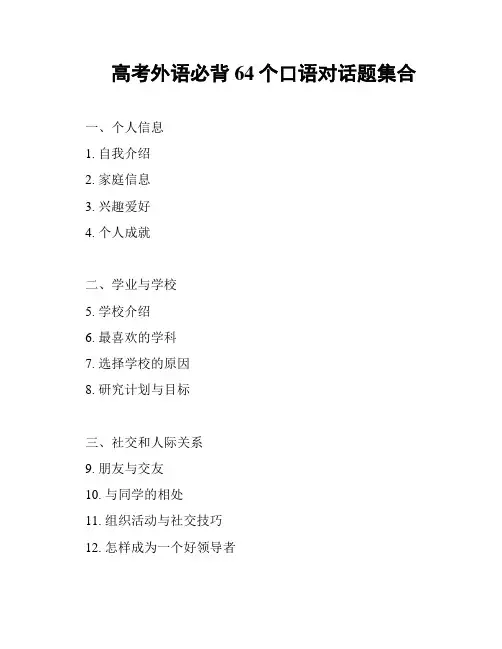
高考外语必背64个口语对话题集合一、个人信息1. 自我介绍2. 家庭信息3. 兴趣爱好4. 个人成就二、学业与学校5. 学校介绍6. 最喜欢的学科7. 选择学校的原因8. 研究计划与目标三、社交和人际关系9. 朋友与交友10. 与同学的相处11. 组织活动与社交技巧12. 怎样成为一个好领导者四、旅行与文化13. 最喜欢的旅行地点14. 旅行的好处15. 介绍一个自己喜欢的文化16. 体验异国文化的经历五、工作与职业17. 理想的职业18. 实经历19. 如何在工作中取得成功20. 你的职业规划六、科技与媒体21. 我的电脑使用经验22. 手机的优点与缺点23. 网络安全问题24. 社交媒体的影响七、健康与生活方式25. 如何保持健康生活惯26. 健身与运动的重要性27. 有益于健康的饮食惯28. 健康与压力管理八、环境与社会议题29. 环保行动与个人责任30. 垃圾分类与回收31. 动物保护与关怀32. 社会公益活动九、时事与全球问题33. 大国关系34. 气候变化与环境问题35. 科技对社会的影响36. 全球教育与贫困问题十、经济与消费37. 理财与投资38. 网购与实体店购物39. 现代消费文化40. 节约与浪费的观念十一、个人观点和价值观41. 幸福的定义42. 家庭在人生中的重要性43. 人类与动物的关系44. 尊重与包容的重要性十二、教育和教学45. 好的教师与研究方法46. 视听教育与传统教育的比较47. 学生压力与心理健康48. 优质教育资源的分配十三、艺术与娱乐49. 艺术对生活的重要性50. 电影与电视节目51. 音乐对情绪的影响52. 运动与娱乐活动十四、科学与未来发展53. 未来的交通工具54. 空间探索与太空旅行55. 人工智能与机器人的发展56. 自然资源与可持续发展十五、社会问题与道德伦理57. 欺骗行为与诚实道德58. 沉迷网络与健康成长59. 科技对隐私的侵犯60. 人工智能伦理问题十六、历史与文学61. 最喜欢的历史人物62. 经典文学作品的价值63. 和庆祝活动64. 传统文化的保护与传承以上是高考外语必背64个口语对话题集合,希望对你的准备有所帮助。

高三口语流利度高级练习40题(带答案)1. You meet your classmate in the corridor. What would you say?A. Hello! How are you?B. Nice to see you!C. Good morning!D. Hi! What's up?答案解析:D。
在走廊遇到同学,用“Hi! What's up?”比较自然随意,适合日常情景对话。
Hello 和Good morning 比较正式,Nice to see you 通常在稍微正式一点的场合或者一段时间没见后使用。
2. Your teacher asks you a question in class. What's a proper response?A. I don't know.B. Sorry, I can't answer.C. Let me think...D. I'll try to answer.答案解析:D。
老师提问时积极回应“I'll try to answer.”表示愿意尝试回答,态度积极。
I don't know 和Sorry, I can't answer 比较消极,Let me think...有点含糊。
3. You see your friend looking sad. What can you say?A. What's wrong?B. Are you okay?C. Why are you sad?D. What happened?答案解析:A。
询问朋友怎么了,“What's wrong?”最简洁直接。
Are you okay?比较宽泛,Why are you sad?和What happened?有点生硬。
4. You are late for school. What would you say to the teacher?A. I'm sorry I'm late.B. Sorry, I was delayed.C. I apologize for being late.D. Excuse me for being late.答案解析:A。
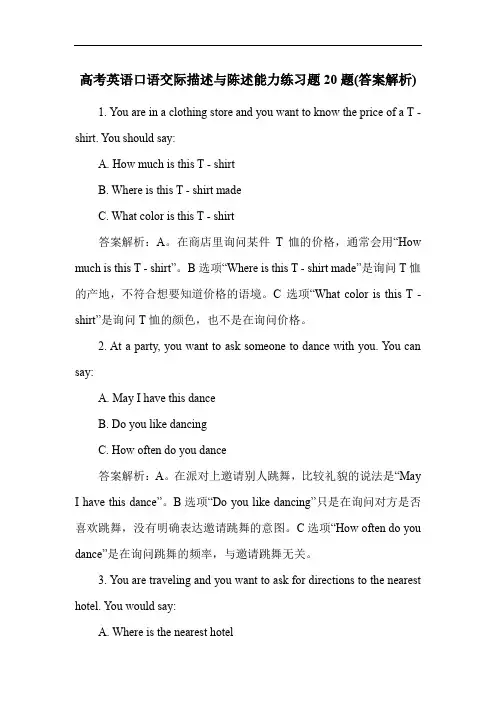
高考英语口语交际描述与陈述能力练习题20题(答案解析)1. You are in a clothing store and you want to know the price of a T - shirt. You should say:A. How much is this T - shirtB. Where is this T - shirt madeC. What color is this T - shirt答案解析:A。
在商店里询问某件T恤的价格,通常会用“How much is this T - shirt”。
B选项“Where is this T - shirt made”是询问T恤的产地,不符合想要知道价格的语境。
C选项“What color is this T - shirt”是询问T恤的颜色,也不是在询问价格。
2. At a party, you want to ask someone to dance with you. You can say:A. May I have this danceB. Do you like dancingC. How often do you dance答案解析:A。
在派对上邀请别人跳舞,比较礼貌的说法是“May I have this dance”。
B选项“Do you like dancing”只是在询问对方是否喜欢跳舞,没有明确表达邀请跳舞的意图。
C选项“How often do you dance”是在询问跳舞的频率,与邀请跳舞无关。
3. You are traveling and you want to ask for directions to the nearest hotel. You would say:A. Where is the nearest hotelB. How is the nearest hotelC. When was the nearest hotel built答案解析:A。
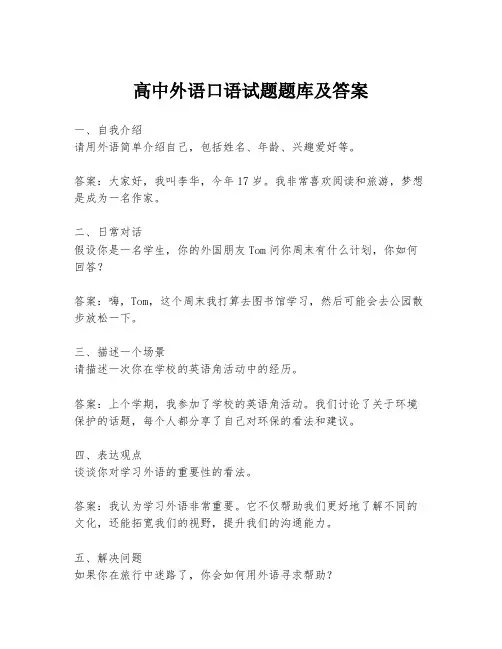
高中外语口语试题题库及答案一、自我介绍请用外语简单介绍自己,包括姓名、年龄、兴趣爱好等。
答案:大家好,我叫李华,今年17岁。
我非常喜欢阅读和旅游,梦想是成为一名作家。
二、日常对话假设你是一名学生,你的外国朋友Tom问你周末有什么计划,你如何回答?答案:嗨,Tom,这个周末我打算去图书馆学习,然后可能会去公园散步放松一下。
三、描述一个场景请描述一次你在学校的英语角活动中的经历。
答案:上个学期,我参加了学校的英语角活动。
我们讨论了关于环境保护的话题,每个人都分享了自己对环保的看法和建议。
四、表达观点谈谈你对学习外语的重要性的看法。
答案:我认为学习外语非常重要。
它不仅帮助我们更好地了解不同的文化,还能拓宽我们的视野,提升我们的沟通能力。
五、解决问题如果你在旅行中迷路了,你会如何用外语寻求帮助?答案:如果我迷路了,我会用外语礼貌地询问路人:“Excuse me, could you please help me? I'm lost and I need to find the way to the train station.”六、文化差异描述一下你了解到的中国和外国文化中的一个差异。
答案:在中国,我们通常会用筷子吃饭,而在许多西方国家,人们则习惯使用刀叉。
这是饮食文化中一个明显的差异。
七、讨论话题请就“全球化对青少年的影响”这一话题展开讨论。
答案:全球化为青少年提供了更多的学习机会和文化交流的平台。
然而,它也可能带来一些挑战,比如文化冲突和身份认同问题。
八、模拟面试假设你正在参加一个外语学校的面试,请用外语回答面试官的问题。
面试官:你为什么想学习外语?答案:我学习外语是因为我对不同的文化感兴趣,并且我相信掌握一门外语可以为我未来的职业发展提供更多机会。
结束语:通过这些口语试题的练习,可以帮助高中生提高外语口语能力,增强跨文化交流的自信。
希望每位学生都能在外语学习的道路上不断进步,享受语言带来的无限乐趣。

高三英语口试试题及答案试题一:题目:描述你最喜欢的季节,并解释为什么。
答案:My favorite season is autumn. The reason is multifaceted. Firstly, the weather in autumn is neither too hot nor too cold, making it the most comfortable time of the year. Secondly, the scenery during this season is breathtaking,with leaves changing colors and creating a picturesque landscape. Lastly, autumn is a harvest season, symbolizingthe fruits of labor and the joy of reaping what has been sown. 试题二:题目:谈论你对未来职业的规划。
答案:I have a clear vision for my future career. I aspire to become an environmental scientist. This ambition stems frommy passion for protecting the environment and my interest in scientific research. To achieve this goal, I plan to pursue higher education in environmental science and engage inrelated internships to gain practical experience. I also aimto stay updated with the latest developments in the field to contribute effectively to environmental conservation efforts.试题三:题目:描述你最近参加的一次学校活动,并分享你的体验。
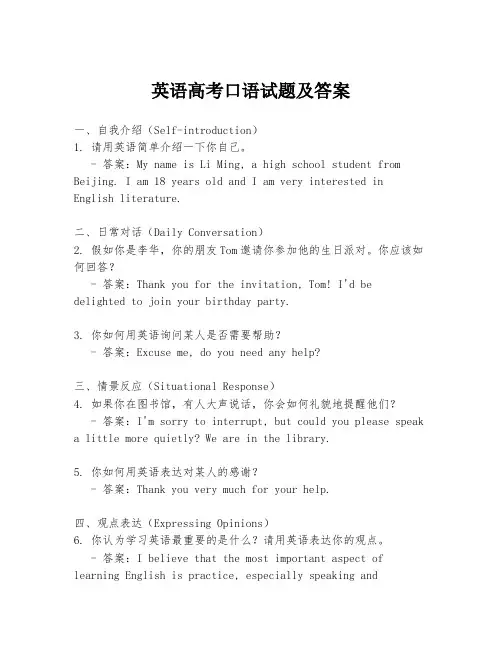
英语高考口语试题及答案一、自我介绍(Self-introduction)1. 请用英语简单介绍一下你自己。
- 答案:My name is Li Ming, a high school student from Beijing. I am 18 years old and I am very interested in English literature.二、日常对话(Daily Conversation)2. 假如你是李华,你的朋友Tom邀请你参加他的生日派对。
你应该如何回答?- 答案:Thank you for the invitation, Tom! I'd be delighted to join your birthday party.3. 你如何用英语询问某人是否需要帮助?- 答案:Excuse me, do you need any help?三、情景反应(Situational Response)4. 如果你在图书馆,有人大声说话,你会如何礼貌地提醒他们?- 答案:I'm sorry to interrupt, but could you please speak a little more quietly? We are in the library.5. 你如何用英语表达对某人的感谢?- 答案:Thank you very much for your help.四、观点表达(Expressing Opinions)6. 你认为学习英语最重要的是什么?请用英语表达你的观点。
- 答案:I believe that the most important aspect of learning English is practice, especially speaking andlistening.7. 描述一下你理想中的英语老师。
- 答案:In my opinion, an ideal English teacher should be patient, knowledgeable, and enthusiastic about teaching.五、故事复述(Story Retelling)8. 请根据以下提示词复述灰姑娘的故事:Cinderella, fairy godmother, pumpkin, glass slipper, prince, ball, lost, found. - 答案:Cinderella was a kind and lovely girl who lived with her stepmother and stepsisters. One day, her fairy godmother turned a pumpkin into a carriage and helped her attend the royal ball. There, she danced with the prince and left a glass slipper when she had to flee at midnight. The prince found the slipper and searched for the owner, eventually finding Cinderella and recognizing her as the girl from the ball.六、问题回答(Question and Answer)9. 如何用英语询问某人的职业?- 答案:What's your occupation?10. 你如何用英语表达你的生日?- 答案:My birthday is on the 15th of March.七、角色扮演(Role Play)11. 假如你是一名导游,你将如何向游客介绍故宫?- 答案:Ladies and gentlemen, welcome to the Forbidden City, the imperial palace for the emperors of the Ming and Qing dynasties. It's one of the largest and well-preserved ancient palaces in the world.12. 如果你是餐厅服务员,顾客点了一道你不太熟悉的菜,你应该如何回答?- 答案:I apologize for the confusion, but I'm not quite familiar with that dish. Let me check with the chef and get back to you with more information.八、辩论(Debate)13. 你认为学生是否应该穿校服?请用英语表达你的观点并给出理由。
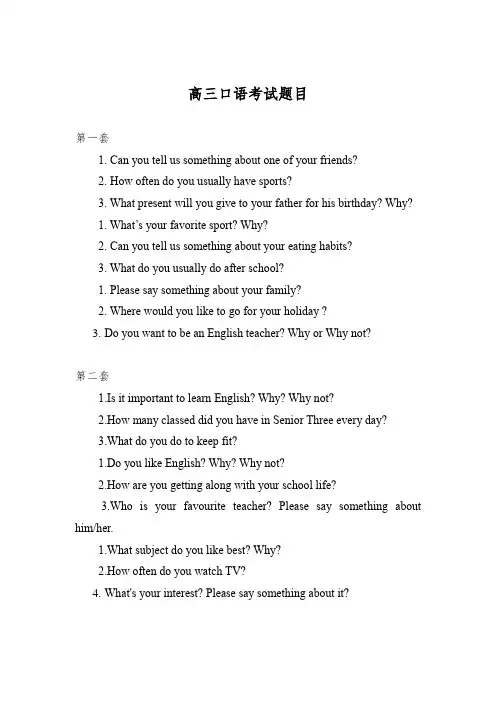
高三口语考试题目第一套1. Can you tell us something about one of your friends?2. How often do you usually have sports?3. What present will you give to your father for his birthday? Why?1. What’s your favorite sport? Why?2. Can you tell us something about your eating habits?3. What do you usually do after school?1. Please say something about your family?2. Where would you like to go for your holiday ?3.Do you want to be an English teacher? Why or Why not?第二套1.Is it important to learn English? Why? Why not?2.How many classed did you have in Senior Three every day?3.What do you do to keep fit?1.Do you like English? Why? Why not?2.How are you getting along with your school life?3.Who is your favourite teacher? Please say something about him/her.1.What subject do you like best? Why?2.How often do you watch TV?4.What's your interest? Please say something about it?Part One: Read aloud the following passage. You will have one minute to prepare and thirty seconds to read.Charlie’s mother noticed a key on the table. “Charlie,” she called, “your father left this key here today. Please hurry and take it to him. Run all the way – and don’t stop for anything.”Charlie went running down the path from his house. He started playing with the key, throwing it high in the air and jumping up to catch it again. Suddenly the key fell through his fingers, dropping to the ground, and rolled out of sight.He felt ashamed when he told his father about the lost key. Charlie’s father was angry and said, “You are very careless, my son. The next time you have something important to carry, put it in your pocket.”Part Two: Make quick responses to the sentences you hear:1. May I speak to Mr. Johnson, the hotel manager?2. Could I have two tickets for the Lion King for Friday night?3. You ought not to be smoking here, sir.4. If I were you, I’d sent him an email.5. You’ve been doing a very good job in organizing the party.Part Three: Ask two questions about each situation given below. At least one special question should be asked about each situation:(1-2) One of your classmates seems upset about something. Ask him two questions to show your concern.(3-4) You are now working for the Students Union to enroll volunteers for the coming international conferences. One of your schoolmates wants to be a volunteer. Ask him two questions.Part One: Read aloud the following passage. You will have one minute to prepare and thirty seconds to read.British potato farmers were taking to the streets for the expression “couch potato” to be removed from the Oxford English Dictionary, for it harms the image of the vegetable. The British Potato Organization wants the Dictionary to replace the expression with the term “couch slouch”. Kathy Race, head of marketing at the Organization, said, “We are trying to get rid of the image that potatoes are bad for you. The potato has been criticized in the past.” The Dictionary says “couch potato” started as American, meaning “a person who spends a great deal of time watching television.”Part Two: Make quick responses to the sentences you hear:1.Could you tell me how to find some books on English grammar?2.What do you prefer, action movies or dramas?3.I can’t concentrate on my work these days.4.How long is the flight from Shanghai to Beijing?5.You’ve got a great ear for music.Part Three: Ask two questions about each situation given below. At least one special question should be asked about each situation:(1-2) You and Your classmates are talking about a robbery which happened in a bank last night. Ask two questions about it.(3-4) Your English teacher is introducing a very good English programme, Studio Classroom, to you. Ask the teacher two questions about it.。
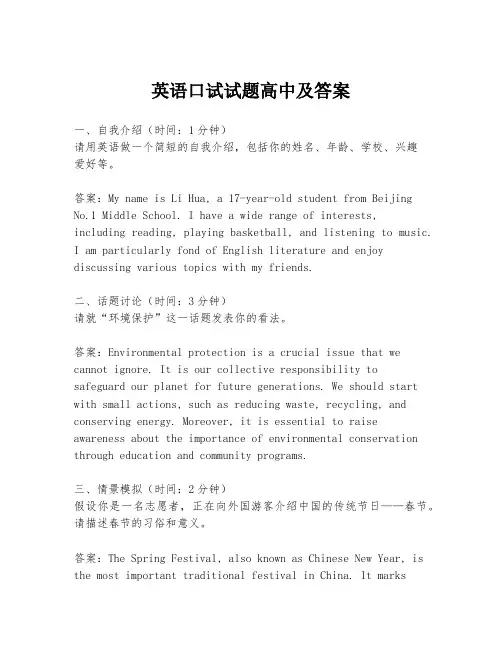
英语口试试题高中及答案一、自我介绍(时间:1分钟)请用英语做一个简短的自我介绍,包括你的姓名、年龄、学校、兴趣爱好等。
答案:My name is Li Hua, a 17-year-old student from Beijing No.1 Middle School. I have a wide range of interests,including reading, playing basketball, and listening to music.I am particularly fond of English literature and enjoy discussing various topics with my friends.二、话题讨论(时间:3分钟)请就“环境保护”这一话题发表你的看法。
答案:Environmental protection is a crucial issue that we cannot ignore. It is our collective responsibility to safeguard our planet for future generations. We should start with small actions, such as reducing waste, recycling, and conserving energy. Moreover, it is essential to raise awareness about the importance of environmental conservation through education and community programs.三、情景模拟(时间:2分钟)假设你是一名志愿者,正在向外国游客介绍中国的传统节日——春节。
请描述春节的习俗和意义。
答案:The Spring Festival, also known as Chinese New Year, is the most important traditional festival in China. It marksthe beginning of a new year on the lunar calendar. Customs include family reunions, setting off firecrackers to ward off evil spirits, and giving red envelopes filled with money as a symbol of good luck and prosperity. The festival is a timefor people to express their best wishes and to strengthen family bonds.四、问题回答(时间:2分钟)1. 你认为学习英语最大的挑战是什么?答案:I believe the biggest challenge in learning English is overcoming the fear of making mistakes and building confidence in speaking. It is important to practice regularly and immerse oneself in the language as much as possible.2. 你如何提高英语听力理解能力?答案:To improve my English listening comprehension, I listen to English podcasts, watch English movies with subtitles, and participate in language exchange programs. These activities help me to familiarize myself with different accents and speaking speeds.五、即兴演讲(时间:3分钟)请以“科技与教育”为题,做一个简短的演讲。
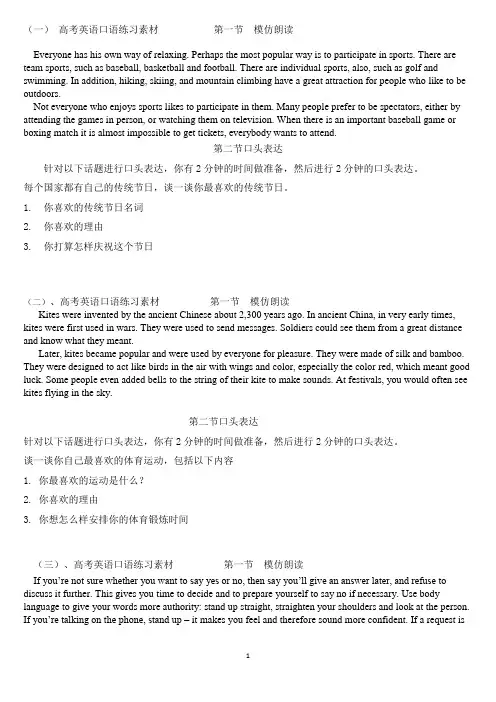
(一)高考英语口语练习素材第一节模仿朗读Everyone has his own way of relaxing. Perhaps the most popular way is to participate in sports. There are team sports, such as baseball, basketball and football. There are individual sports, also, such as golf and swimming. In addition, hiking, skiing, and mountain climbing have a great attraction for people who like to be outdoors.Not everyone who enjoys sports likes to participate in them. Many people prefer to be spectators, either by attending the games in person, or watching them on television. When there is an important baseball game or boxing match it is almost impossible to get tickets, everybody wants to attend.第二节口头表达针对以下话题进行口头表达,你有2分钟的时间做准备,然后进行2分钟的口头表达。
每个国家都有自己的传统节日,谈一谈你最喜欢的传统节日。
1. 你喜欢的传统节日名词2. 你喜欢的理由3. 你打算怎样庆祝这个节日(二)、高考英语口语练习素材第一节模仿朗读Kites were invented by the ancient Chinese about 2,300 years ago. In ancient China, in very early times, kites were first used in wars. They were used to send messages. Soldiers could see them from a great distance and know what they meant.Later, kites became popular and were used by everyone for pleasure. They were made of silk and bamboo. They were designed to act like birds in the air with wings and color, especially the color red, which meant good luck. Some people even added bells to the string of their kite to make sounds. At festivals, you would often see kites flying in the sky.第二节口头表达针对以下话题进行口头表达,你有2分钟的时间做准备,然后进行2分钟的口头表达。
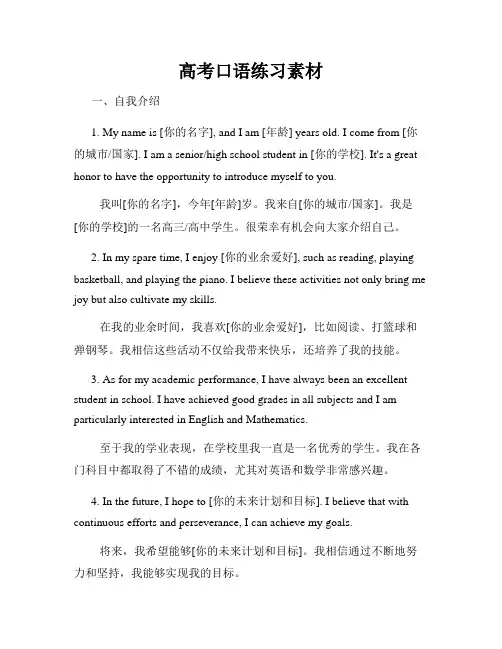
高考口语练习素材一、自我介绍1. My name is [你的名字], and I am [年龄] years old. I come from [你的城市/国家]. I am a senior/high school student in [你的学校]. It's a great honor to have the opportunity to introduce myself to you.我叫[你的名字],今年[年龄]岁。
我来自[你的城市/国家]。
我是[你的学校]的一名高三/高中学生。
很荣幸有机会向大家介绍自己。
2. In my spare time, I enjoy [你的业余爱好], such as reading, playing basketball, and playing the piano. I believe these activities not only bring me joy but also cultivate my skills.在我的业余时间,我喜欢[你的业余爱好],比如阅读、打篮球和弹钢琴。
我相信这些活动不仅给我带来快乐,还培养了我的技能。
3. As for my academic performance, I have always been an excellent student in school. I have achieved good grades in all subjects and I am particularly interested in English and Mathematics.至于我的学业表现,在学校里我一直是一名优秀的学生。
我在各门科目中都取得了不错的成绩,尤其对英语和数学非常感兴趣。
4. In the future, I hope to [你的未来计划和目标]. I believe that with continuous efforts and perseverance, I can achieve my goals.将来,我希望能够[你的未来计划和目标]。

英语口试试题高中及答案一、自我介绍问题:请用英语简单介绍一下你自己,包括你的姓名、年龄、学校和爱好。
答案:My name is Li Hua. I am 17 years old and currently studying at Sunshine High School. I have a wide range of interests, but I am particularly passionate about reading, playing basketball, and learning English.二、日常对话问题:假设你的朋友邀请你参加一个生日派对,你该如何用英语回应?答案:Oh, that sounds like a great idea! I'd love to join the birthday party. Thank you for inviting me. I will make sure to be there and celebrate with you.三、描述一个场景问题:请描述一下你在学校图书馆学习的场景。
答案:The school library is a quiet and peaceful place where I often go to study. There are rows of bookshelves filled with a variety of books, and the atmosphere is conducive to concentration. I usually find a comfortable seat, take out my textbooks and notes, and immerse myself in my studies.四、讨论一个话题问题:你认为学习英语的重要性是什么?请用英语表达你的观点。
高三英语练习题:口语交际用语Introduction口语交际是英语学习中的重要环节,它需要我们熟练掌握各种常用的交际用语。
本文为高三学生准备了一些口语交际练习题,以帮助他们更好地提升口语表达能力。
1. Greetings and Introductions- A: Hi, how are you?B: I'm fine, thanks. And you?- A: Good morning/afternoon/evening. How do you do?B: Good morning/afternoon/evening. Nice to meet you.- A: Excuse me, are you Mr. Smith?B: Yes, I am. And who are you?2. Making a Request- A: Can you lend me your pen, please?B: Sure, here you go.- A: Could you please help me carry this suitcase?B: Of course, I'd be happy to help.- A: Would you mind closing the window?B: Not at all, I'll do it right away.3. Offering Help- A: Do you need any assistance?B: Actually, yes. Could you show me the way to the nearest subway station?- A: Need a hand with your groceries?B: Thank you for offering, but I'm fine.- A: Can I help you with anything?B: Yes, please. Could you help me find a book on the first floor?4. Expressing Opinion- A: What do you think about the new movie?B: I thought it was fantastic. I really enjoyed it.- A: How do you feel about the idea of having a school trip?B: Personally, I think it's a great idea. It would be a fun and educational experience for everyone.- A: What's your take on the current environmental issues?B: I believe it's crucial for us to take immediate action to protect the environment. It's our responsibility.5. Asking for Permission- A: May I use your computer for a moment?B: Sorry, but I'm using it right now.- A: Is it okay if I borrow your phone charger?B: Sure, go ahead.- A: Can I take a day off from work next week?B: I'm afraid it's not possible. We have an important meeting scheduled.Conclusion通过练习这些口语交际用语,我们可以增强自己在日常交流中的表达能力。
高考英语口试题目及答案一、自我介绍(Self-introduction)1. 请用英语简单介绍你自己。
- 答案:My name is Li Hua. I am 18 years old and currently a senior high school student.二、日常对话(Daily Conversation)2. 你通常如何度过周末?- 答案:I usually spend my weekends reading books, watching movies, and hanging out with friends.3. 你最喜欢的季节是什么?为什么?- 答案:My favorite season is autumn because the weather is cool and the leaves are beautiful.三、话题讨论(Topic Discussion)4. 你认为学习英语的重要性是什么?- 答案:I believe learning English is important because it is a global language and can help us communicate with people from different countries.5. 描述一下你理想中的工作。
- 答案:My ideal job would be as a software engineer because I am passionate about technology and enjoy problem-solving.四、情景模拟(Situational Simulation)6. 假设你在一家餐厅,服务员问你需要什么帮助。
- 答案:Excuse me, could you please recommend a popular dish? And I would like to have a glass of water.7. 你正在和一个外国朋友讨论中国传统节日,你会如何介绍春节?- 答案:The Spring Festival, also known as Chinese New Year, is the most important traditional festival in China. It marks the beginning of the lunar new year and is a time for family reunions and celebrations.五、观点阐述(Opinion Expression)8. 你如何看待环境保护?- 答案:I think environmental protection is crucial for our planet. We should reduce pollution, recycle more, and protect natural resources.9. 你认为科技对日常生活的影响是什么?- 答案:I believe technology has a significant impact on our daily lives. It makes communication easier, provides access to information, and improves efficiency.六、问题解决(Problem Solving)10. 如果你在学习中遇到难题,你通常如何解决?- 答案:When I encounter difficulties in my studies, I usually seek help from my teachers or classmates, and I also research the topic online to gain a deeper understanding.11. 描述一下你如何解决与朋友的误会。
高考英语口语考试训练材料1 疑问句吴春华编一疑问句的构成一般疑问句:Are you a student?Did you have a good time in Japan? Will you go to the supermarket?Have you read this book before?Can you give me a hand?一般疑问句一般用“yes"或“no”来回答。
特殊疑问句:一般结构是:疑问词+ 一般疑问句问人物:Who will hold the party?问时间: When is the library open?What are the business hours? How long will the meeting last?问地点:Where can I buy some potatoes? What places will you plan to visit?问事件: What will you do in the bookstore this afternoon? What subject do you like best?问方式:How do you go there?问原因: Why do you prefer to travel by air?问价钱:How much is the shirt?How much will the trip cost?问数量: How many students will attend the lecture?但提问主语部分的特殊疑问句采用陈述句的词序。
如:Who is reading a book at the window?谁在窗户下念书?提问修饰主语的定语时也采用这种结构。
如:Whose children came here yesterday?谁的孩子昨天来这里了?高考英语口语考试训练材料2 模拟试题一考前准备: 耳机, 麦克风, 测试录音设备(是否清晰)考试过程:一口语测试开场白Hello,Welcome to PETS 2 speaking test!My name is Wang Jing. Nice to meet you!二询问考生个人信息以下四个问题由计算机提问,考生回答.1。
口语考试精选样题(组卷人:——朱海)Test OnePart OnePeople do get hurt in "adventure sports" and the most dangerous is climbing, which kills eight people a year. But it is not always obvious which activities are dangerous. For instance, two people die every year in hanggliding accidents, but the same number are killed by badminiton, whereas six people a year die in fishing accidents! So "exciting" isn't always the same as "dangerous". This is even more true when you consider the activities of every day life. Many more people die due to accidents in the home than from sports of any king.Test TwoPart OneTeenagers who don't get up in the morning are brighter and more successful.A study of students' sleep by reserarchers in the USA found that teenagers who get up early are often tired and can't concentrate in class."Young children love to get up early but teenagers have a different biological clock," says a professor of Brown University. Her reserach showed that teenagers naturally go to sleep and wake up later than normal-for good biological reasons.Now many American schools have changed the start of their morning classes from 7.30 to 8.30 or even 9.00.Test ThreePart OneIf you're not sure whether you want to say yes or no, then say you'll give an answer later,and refuse to discuss it further. This gives you time to decide and to prepare yourself to say no if necessary. Use body language to give your words more authority:stand up straight, straighten your shoulders and look at the person. If your're talking on the phone, stand up-it makes you feel and therefore sound more confident. If a request is reasonable but you don't want to do it, then offer an alternative, for example, "I don't have time on Saturday, but I could do it one night next week."Test FourPart OneAt last, after what seemed to us an age, the liftboat reached the man and two of the sailors pulled him on board. This was not at all easy, for the sea was rather rough. Then the sailors began to row back to the ship again. the lift boat was rasied out of the water and the rescued man, wrapped in a blanket, was helped out on to the deck. Leaning on the arm of the ship's doctor, but still able to walk in spite of his terrible experience, he was led off to the ship's hospital. As he passed along the deck, everyone cheered loudly. Test FivePart OneWorking long hours can greatly increase the risk of suffering injury or illness, a recent risk study says. Workers who do overtime were 61% more likely to become hurt or ill, once factors such as age and so on were taken into account. And working more than 12 hours a day raised the risk by more than a third, one of the universitities in Chicago found. According to their report, risk increased with longer working hours, not just a dangerous jobs, but in all types of work.Test SixPart OneThe new Harry Potter book "Harry Potter and the Half-Blood Prince" sold an astonishing6.9 million copies in its first 24 hours, breaking the record held by the previous release. "Harry Potter and the Half-Blood Prince" averaged better than 250,000 sales per hour, more than most books sell in a lifetime. Some other writers, even the most popular ones of adult fiction, sell no more than 20,000 books in the first week of sale.Test SevenPart OneIndians are the world's biggest bookworms, reading on average 10.7 hours a week, twice as long as Americans, according to a new survey. The NOP World Culture Score index surveyed 30,000 people in 30 countries from December 2004 to February 2005. Experts said the desire to read could explain India's high figures. Time spent on reading meant fewer hours watching TV and listening to the radio - India came fourth last in both. The survey saw China take second place and the Philippines take third in average hours a week, spent reading books, newspapers and magazines.Test EightPart OneA rich young man decided to do some diving in the sea, so he bought a rubber suit, and took some lessons at a diving school. Then one day, he walked into the water and began to explore the bottom of the sea.He suddenly saw a man waving his arms and legs around wildly near the bottom of the sea. He was only wearing a bathing suit.The rich young man was very surprised to see him, so he took out a plastic notebook and a special pencil and wrote "What are you doing?’ The other man took the pencil and wrote "Drowning!"Test NinePart OneBritish potato farmers were taking to the streets for the expression "couch potato" to be removed from the Oxford English Dictionary, for it harms the image of the vegetable. The British Potato Organization wants the Dictionary to replace the expression with the term "couch slouch". Kathy Race, head of marketing at the Organization, said, "We are trying to get rid of the image that potatoes are bad for you. The potato has been criticized in the past." The Dictionary says "couch potato" started as American, meaning "a person who spends a great deal of time watching television."Test TenPart OneOne U.S. company said on August 10 that it wants to send two tourists on a trip around the moon at a cost of $500 million per ticket. Space Adventures Company, which has already sent two citizens on separate trips into space, says it has researched and identified more than a thousand customers, who are interested, with the necessary wealth for a moon shot as early as 2008. The trip around the moon would last between 8 and 21 days, depending on whether the travelers make a stop at the International Space Station.Test ElevenPart OneTo make an Olympic champion takes millions of young people around the world to be inspired to choose Olympic sport.I'm delighted we have with us today representatives of the next generation. We're serious about inspiring young people. And thanks to London's multi-cultural mix of 200 nations, they also represent the youth of the world. Their families have come from everycontinent. They practice every religion and every faith. What unites them is London, their love of sport and their heartfelt dream of bringing the Olympic Games to our city.Test Twelve(2014宁夏高校高考口语真题)Part OnePolice are looking for robbers who stole valuable diamonds from the jewelry display at the City Center yesterday evening during the annual Gold Exhibition. The owner reported that a necklace estimated to be worth $1.5 million was taken by a young couple. A witness at the scene said that a couple in their early twenties caught her eye because they seemed too young to be interested in such expensive jewelry. In her version of the story, the pair were dressed in clothing and hairstyles that seemed too casual for the rather formal atmosphere of the jewelry show.。
2023江苏高三英语口语考试真题全文共3篇示例,供读者参考篇12023 Jiangsu High School Senior English Speaking Exam QuestionsPart I: Self-introduction1. Can you introduce yourself briefly?2. What are your hobbies and interests?3. What are your strengths and weaknesses?4. What are your future plans after graduation?5. How would you describe your personality?Part II: Personal experiences1. Can you share a memorable experience from your school life?2. Have you ever faced a difficult situation? How did you handle it?3. Can you talk about a time when you had to work in a team?4. Have you ever participated in a competition or event? How did it go?5. Can you share a moment when you felt proud of yourself?Part III: Social issues1. What do you think are the biggest challenges facing young people today?2. How can we address the issue of bullying in schools?3. Do you think technology has more positive or negative effects on society?4. What can be done to promote environmental protection?5. How important is it for young people to be actively involved in community service?Part IV: Future aspirations1. What career path are you considering for your future?2. How do you plan to achieve your goals and aspirations?3. Can you talk about a role model or someone who has inspired you?4. Where do you see yourself in 10 years?5. What advice would you give to your younger self?Remember to speak clearly and confidently, and express your thoughts and ideas clearly. Good luck with your exam!篇22023 Jiangsu Senior High School English Oral ExaminationIntroduction:The 2023 Jiangsu Senior High School English Oral Examination is an important component of the college entrance examination for high school seniors in Jiangsu Province. It is designed to test students' English language proficiency and communication skills in a real-life context. The examination consists of three parts: a prepared speech, a group discussion, and a role-play scenario. Each part assesses different aspects of the students' language abilities and requires them to demonstrate their ability to express themselves clearly and confidently in English.Part 1: Prepared SpeechIn the prepared speech section, students are required to deliver a 3-minute speech on a given topic. The topics are usually related to current events, social issues, or personal experiences.Students are given some time to prepare their speech before the examination and are expected to present their ideas clearly and coherently. This part of the examination assesses the students' ability to organize their thoughts, articulate their ideas, and engage the audience effectively.Part 2: Group DiscussionThe group discussion section involves a small group of students discussing a topic together for 10 minutes. The topics are typically open-ended and require students to express their opinions, listen to others, and work collaboratively to reach a consensus. This part of the examination assesses the students' ability to communicate effectively in a group setting, listen to others' perspectives, and build on each other's ideas.Part 3: Role-play ScenarioThe role-play scenario requires students to act out a given situation, such as making a travel reservation, resolving a conflict, or giving advice to a friend. Students are given a few minutes to prepare for the role-play and are expected to demonstrate their ability to use English in a practical, real-life context. This part of the examination assesses the students' ability to apply their language skills in a simulated interactive situation anddemonstrate their ability to communicate effectively in different social contexts.Conclusion:Overall, the 2023 Jiangsu Senior High School English Oral Examination is a comprehensive assessment of students' English language proficiency and communication skills. It provides students with an opportunity to demonstrate their ability to express themselves in English, engage in meaningful conversations, and handle real-life situations confidently. By participating in this examination, students can improve their language abilities, boost their confidence, and prepare themselves for future academic and professional opportunities that require English proficiency.篇3Title: 2023 Jiangsu High School Senior English Oral ExaminationIntroduction:The 2023 Jiangsu High School Senior English Oral Examination is a crucial test that assesses students' ability to communicate effectively in English. This examination tests students' listening, speaking, reading, and writing skills. In thisarticle, we will provide an overview of the test format, sample questions, and tips for preparation.Test Format:The 2023 Jiangsu High School Senior English Oral Examination consists of three parts: listening comprehension, reading comprehension, and speaking. In the listening comprehension section, students will listen to a series of recordings and answer questions based on what they hear. The reading comprehension section requires students to read a passage and answer related questions. The speaking section involves a conversation with the examiner on various topics.Sample Questions:1. Listening Comprehension:Listen to the recording about a student's daily routine and answer the following questions:- What time does the student wake up in the morning?- What does the student have for breakfast?- What time does the student go to bed at night?2. Reading Comprehension:Read the passage about climate change and answer the following questions:- What are the main causes of climate change?- How can individuals reduce their carbon footprint?- Why is it important to take action to combat climate change?3. Speaking:Describe your favorite hobby and explain why you enjoy it.Discuss a memorable experience you had while traveling.Share your thoughts on the importance of learning English in today's world.Tips for Preparation:- Practice listening to English recordings to improve your listening skills.- Read English articles and books to enhance your reading comprehension.- Practice speaking English with friends or classmates to build confidence.- Review grammar and vocabulary regularly to strengthen your writing skills.Conclusion:The 2023 Jiangsu High School Senior English Oral Examination is an opportunity for students to demonstrate their English language proficiency. By preparing effectively and practicing regularly, students can increase their chances of success in this important test. Good luck to all students taking the examination!。
高考英语口语考试复习材料公司内部编号:(GOOD-TMMT-MMUT-UUPTY-UUYY-DTTI-高考英语口语考试复习材料Amaintenance has kept the Empire Stare Building in pristine condition. Experts say that as long as its is maintained, it could stand for centuries. Others buildings on the Manhattan skyline won’t be so lucky. But other buildings can’t claim to be enduring symbols of a place anda people. The Empire State Building was one of the last products of the Golden Age of skyscrapers. After World War II, the elegance of the Art Deco giants gave way to the boxy lines of modern height rises. Why did this happen Partly, it grew out of an argument amongst architects over the best ways to dress the frame of a building.2 情景介绍角色:朋友情景:问一个朋友去度假的计划任务:询问相关信息生词:无2-1 你什么时候去度假2-2 你去度假前,我还能够见到你吗2-3 你认为我的工作如何3 请根据你刚才看到的片断,准备一篇口头作文,讲述一位公司经理的故事. 故事说明 Jack是一家公司经理。
他为人固执;常常固执己见,不听下属的劝告。
高三英语口语考试练习材料Test OnePart OnePeople do get hurt in "adventure sports" and the most dangerous is climbing, which kills eight people a year. But it is not always obvious which activities are dangerous. For instance, two people die every year in hanggliding accidents, but the same number are killed by badminiton, whereas six people a year die in fishing accidents! So "exciting" isn't always the same as "dangerous". This is even more true when you consider the activities of every day life. Many more people die due to accidents in the home than from sports of any king.Part Two1.It's nice of you to show me around your school.2.What about taking Bus No 104 to the Shanghai Railway Station?3.I am sorry I have to leave now. I have to catch thelast bus.4.How did you enjoy the concert last night?5.I wonder if I could use your mobile phone.Part Three(1-2)Your friend is inviting you to see a film. Ask your friend two questions about it.(3-4)You have a toothache and want to make a appointment to see Dr Brown. The nurse asks you two questions.Part FourWhat do you think of the development of transportation in Shanghai?Part FiveThe Mid-Autumn Festival is a traditional Chinese holiday...Test TwoPart OneTeenagers who don't get up in the morning are brighter and more successful.A study of students' sleep by reserarchers in the USA found that teenagers who get up early are often tired andcan't concentrate in class."Young children love to get up early but teenagers have a different biological clock," says a professor of Brown University. Her reserach showed that teenagers naturally go to sleep and wake up later than normal-for good biological reasons.Now many American schools have changed the start of their morning classes from 7.30 to 8.30 or even 9.00.Part Two1.(Telephone rings) Hello, may I speak to Mr Smith?2.I'm sorry that I forgot to bring the book here.3.I'd love you to come to my birthday party.4.Why not have another cup of tea?5.You're busy. Is there anything I can do for you?Part Three(1-2)You are in your Rnglish teacher's office, asking the teacher two questions about English learning.(3-4)You have a new deskmate Bob. You want to get to know him. Ask him two questions.Part FourDo you think examinations are the main source of stress in your life? Why?Part FiveOne day Peter and his father went fishing and came back home with a big fish.Test ThreePart OneIf you're not sure whether you want to say yes or no, then say you'll give an answer later, and refuse to discuss it further. This gives you time to decide and to prepare yourself to say no if necessary. Use body language to give your words more authority:stand up straight, straighten your shoulders and look at the person. If your're talking on the phone, stand up-it makes you feel and therefore sound more confident. If a request is reasonable but you don't want todo it, then offer an alternative, for example, "I don't have time on Saturday, but I could do it one night next week."Part Two1.It's really hot today, isn't it?2.What do you think of learning Japanese as a second language?3.Don't forget to buy a hamburger for me.4.Look, what on earth are you doing? The classroom is so messy.5.I haven't finished my homework because I felt extremely tired last night.Part Three(1-2)You are not well. You go to see a doctor. The doctor asks you two questions about your problem.(3-4)You want to borrow a book from the wschool library. Ask the librarian two question about it.Part FourWhat is your opinion of a true friend? (Give an example to illustrate your point.)Part FiveMs wang loves her pet dog "Wang Wang"...Test FourPart OneAt last, after what seemed to us an age, the liftboat reached the man and two of the sailors pulled him on board. This was not at all easy, for the sea was rather rough. Then the sailors began to row back to the ship again. the lift boat was rasied out of the water and the rescued man, wrapped in a blanket, was helped out on to the deck. Leaning on the arm of the ship's doctor, but still able to walk in spite of his terrible experience, he was led off to the ship's hospital. As he passed along the deck, everyone cheered loudly.Part Two1.What do you think of taking a summer English course in Britain?2.How is your cousin? I haven't seen her for ages.3.I don't know how to use this fax machine.4.Can you tell me what time it is now?5. regret that I quarreled with my roommate last night.Part Three。